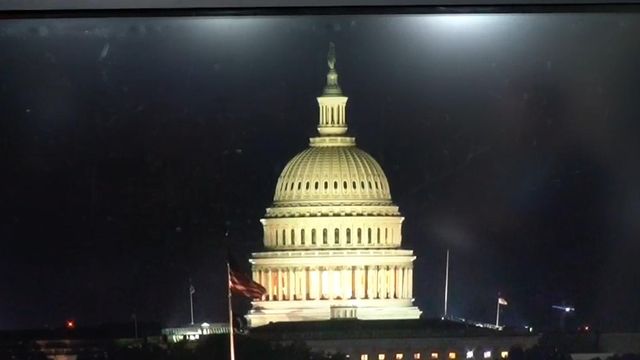‘A Good Day for World Peace’: Biden Signs Aid Bill for Ukraine and Israel
WASHINGTON — President Joe Biden signed a $95.3 billion package of aid to Ukraine, Israel and Taiwan on Wednesday, reaffirming U.S. support for Ukraine in the fight against Russia’s military assault after months of congressional gridlock put the centerpiece of the White House’s foreign policy in jeopardy.
“It’s a good day for world peace,” Biden said from the State Dining Room of the White House. “It’s going to make America safer, it’s going to make the world safer and it continues America’s leadership in the world and everyone knows it.”
The Senate voted overwhelmingly to approve the package Tuesday night, a sign of bipartisan support after increasingly divisive politics raised questions on Capitol Hill and among U.S. allies over whether the United States would continue to back Ukraine. The 79-18 vote provided Biden another legislative accomplishment to point to, even in the face of an obstructionist House.
The Pentagon said Wednesday it would rush the first $1 billion in aid to Ukraine, including shoulder-fired Stinger surface-to-air missiles and other air defense munitions, 155 mm shells, Javelin anti-tank guided missiles, cluster munitions and battlefield vehicles.
But even as he hailed the package Wednesday, Biden said the process should have “been easier, and should have gotten there sooner.”
“It was a difficult path,” he added, saying that those on the ground in Ukraine had cheered the news. “But in the end we did what America always does. We rose to the moment.”
The measure comes as Biden faces backlash in the United States over his support for Israel in the war in the Gaza Strip. The Israeli government’s campaign in Gaza has killed tens of thousands of people and created a hunger crisis there.
“My commitment to Israel,” Biden said, “is ironclad.”
Biden’s critics on the left are angry about his willingness to provide more weapons to Israel, though the legislation also includes $1 billion for humanitarian aid that the president said will be rushed to Gaza.
“Israel must make sure this aid reaches all of the Palestinians in Gaza, without delay,” Biden said.
The president’s signature capped a long road for the White House, one of careful political maneuvering with a new House speaker who faced vehement opposition from the far right of the Republican Party over helping Ukraine.
“Imagine if instead we had failed,” Biden said as he admonished “MAGA Republicans” for allowing Ukrainian officials to run low on artillery.
The White House first sent a request for the security package in October, but Republicans — many of them egged on by former President Donald Trump — said the United States was bearing too much of the burden. Trump, who has long expressed admiration for President Vladimir Putin of Russia, has made clear that he would not back Ukraine if he wins in November.
U.S. officials have bluntly acknowledged that the six-month delay put Ukraine at a disadvantage in its fight against Russia.
“The Russians have slowly but successfully taken more ground from the Ukrainians and pushed them back against their first, second and, in some places, their third line of defense,” John Kirby, a spokesperson for Biden’s National Security Council, said on Tuesday on Air Force One. “The short answer is: Yes, there absolutely has been damage in the last several months.”
The White House strategy in recent months involved impressing upon members of Congress — and the American people — that Ukraine could lose the war without the desperately needed aid.
Biden instructed his top aides to avoid publicly criticizing Speaker Mike Johnson but instead to provide him with regular security briefings on the risks of not sending aid, according to senior administration officials. The officials asked for anonymity to discuss internal deliberations.
Jake Sullivan, the national security adviser, assured Johnson in one call that the United States would be sure to track all of the aid after the speaker called for more accountability over the security assistance.
Biden’s chief of staff, Jeff Zients, held daily strategy sessions with the president’s top aides, including Sullivan; Steve Ricchetti, a senior counselor; and Shuwanza Goff, the director of legislative affairs.
Last month, as the aid remained stuck in gridlock, Sullivan made a secret mission to Kyiv, Ukraine, keeping the issue in the headlines.
Johnson has said that the security briefings, led by CIA Director William Burns, were a crucial factor to winning over his support.
The aid is broken up into four pieces: a measure for each of the three U.S. allies and another meant to sweeten the deal for conservatives that includes a provision that could result in a nationwide ban on TikTok.
The bill includes $60.8 billion for Ukraine; $26.4 billion for Israel and humanitarian aid for civilians in conflict zones, including Gaza; and $8.1 billion for the Indo-Pacific region. It also includes sanctions against Iranian and Russian officials.
The House also added a provision that would require the president to seek repayment from the Ukrainian government of $10 billion. The idea to include some of the aid for Ukraine in the form of a loan was another example of the influence Trump has over Congress.
Trump has called to make any future aid to Ukraine a loan.
This article originally appeared in The New York Times.










